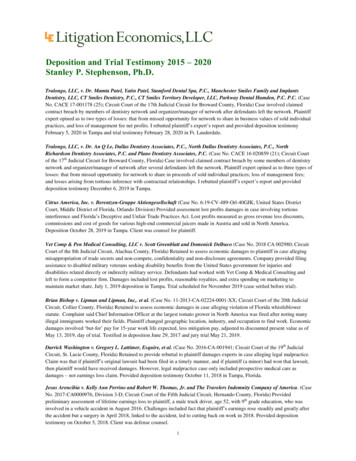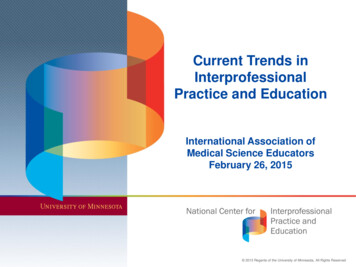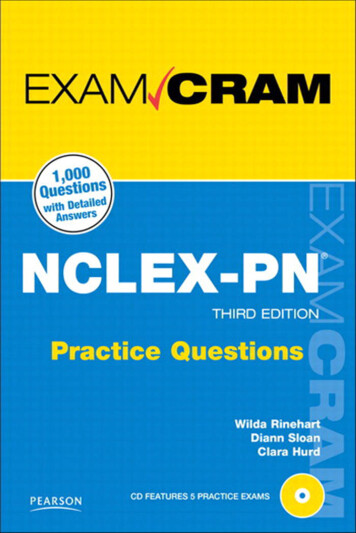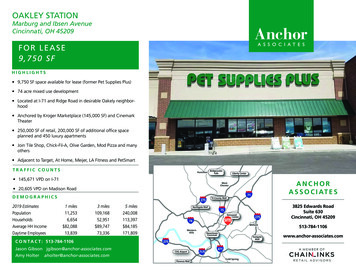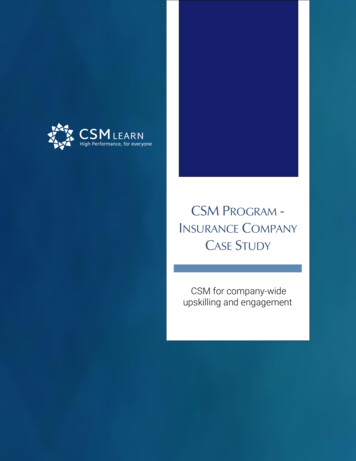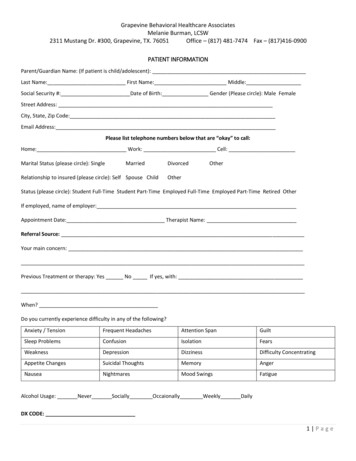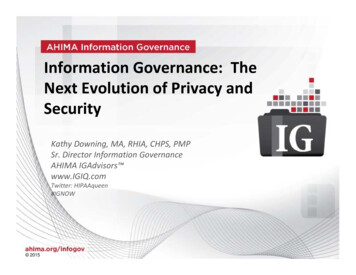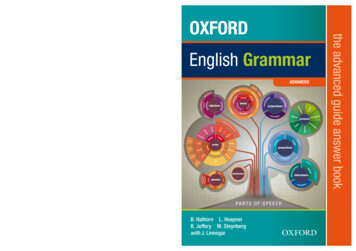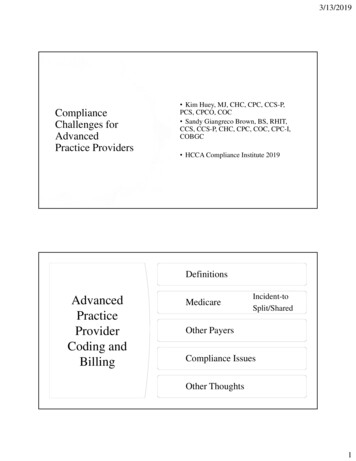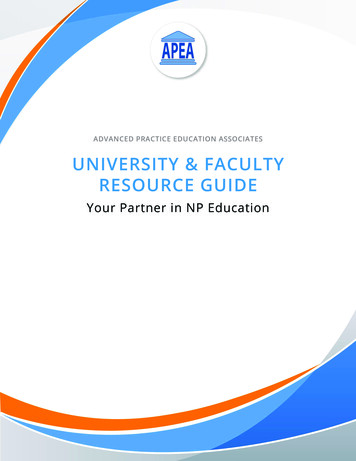
Transcription
2020ADVANCED PRACTICE EDUCATION ASSOCIATESUNIVERSITY& FACULTYAdvanced Practice EducationAssociatesRESOURCE GUIDEUniversity&FacultyYour Partner in NP EducationResource GuideYour Partner in NP Education
Table of ContentsAbout APEA . 3Individualized University Resources . 4Review Courses . 5Exams . 6Predictor Exams . 7Study Questions . 11Specialty Track ResourcesFamily & Adult-Gerontology Primary Care . 12Psychiatric-Mental Health . 13Adult-Gerontology Acute Care . 14Pediatric Primary Care . 15Women’s Health . 16Pharmacology & Prescribing Resources . 17Textbooks & Mobile Resources . 18Essential Clinical Skills for NPs . 19Billing & Coding Resources . 20Continuing Education . 21
About APEAAn Innovator in NP EducationAdvanced Practice Education Associates (APEA) was founded in 1997 to help prepare graduating NPstudents for their certification exams. Since its first live review course more than 2 decades ago, APEAhas expanded in scope to serve NP programs and practicing NPs. APEA’s extensive suite of products foruniversities includes innovative and effective practice question banks, diagnostic and predictive exams,reference and review books, and user-friendly clinical resources that assist faculty in preparing studentsfor certification success.Amelie Hollier, DNP,FNP-BC, FAANPJeanie Doucet, MBA,MT (ASCP)APEA distinguishes itself in the marketplace by developing resources thatanticipate and meet the evolving needs of universities. This commitmentto providing resources in education goes beyond a core business model;APEA is invested in assuring that APRNs are prepared to deliver safe andeffective healthcare. To that end, APEA is dedicated to providing faculty withexceptional services and products that help prepare students for success.APEA university products assist faculty in assuring that students achievethe foundational knowledge necessary for certification success. In addition,APEA products help faculty meet the rigorous requirements set by CCNE andACEN.APEA is owned by Amelie Hollier, DNP, FNP-BC, FAANP, and JeanieDoucet, MBA, MT (ASCP). Their creativity, vision, and dedicationare evident throughout the continuum of resources APEA has developed.Amelie and Jeanie are hands-on owners in every way. They attend all APEAreview courses, traveling throughout the country to provide educationalexperiences that consistently receive five-star ratings and 99% pass rates.They work closely with university clients to ensure that programs achievethe best possible student outcomes. APEA’s goal is your goal: excellencein NP education. Join the many universities that have benefited from theirexpertise and experience. We welcome inquiries at questions@apea.com.3
Individualized University ResourcesConsultant Services, Educational Assessment,Student & Faculty SupportAPEA provides customized consultant services, educational assessment, and support to universities.Consultant ServicesAt the helm of APEA’s university and faculty services is Betty Vicknair,MSN, APRN, PNP. Betty uses her extensive clinical and teachingexperience to provide personalized and individualized recommendationsfor curriculum and program development, to improve program and studentoutcomes utilizing APEA resources. Complimentary consultant servicesprovided exclusively by APEA include:Betty Vicknair, MSN,APRN, PNPbetty@apea.com Tailored direction on exam interpretationConsultation on curriculum developmentRecommendations for remediationGuidance on the integration of APEA resourcesDetailed written summaries of cohort and student exam resultsBetty is the president and founder of the Louisiana Nurse PractitionerFoundation.Educational AssessmentKathy Baldridge, DNP,FNP-BC, FAANPkathy@apea.comKathy Baldridge, DNP, FNP-BC, FAANP, is the director ofpsychometric analysis for APEA and is responsible for item analysis of allAPEA exam questions. Using a standard test item development process,Kathy ensures that all questions are relevant to standardized content foradvanced practice nursing. She uses research and statistical analysis toguarantee that APEA exams are accurate measures of student achievementand proficiency in advanced practice nursing.Kathy’s work ensures that all APEA exams have validity, reliability, andpredictability. In addition, she develops individualized study plans forstudents preparing for the certification exam and for students who reach out to APEA after beingunsuccessful on the certification exam.Kathy is the president of the Louisiana Association of Nurse Practitioners.4
Review CoursesFNP, AGPCNP, AGACNP, PMHNPReview Courses for Four NP Tracks FamilyAdult-gerontology primary careNew! Psychiatric-mental healthComing Soon! Adult-gerontology acute careAPEA review courses for FNPs and AGPCNPs are renowned for their effectiveness. “Clear,concise teaching” and “relatable and relevant content” are common refrains in our five-starratings. Your students can receive this same engaging teaching in one or more ways: Incorporating the APEA Review Courses into the curriculum as assigned lecturesAdding the APEA Review Course as a 1 credit hour courseAttending a live course (FNP or AGPCNP, onsite or webinar)Watching a course on streaming video (FNP, AGPCNP, AGACNP, PMHNP)Listening to an audio recording of a course (FNP, AGPCNP)The APEA Review Courses on streaming video feature side-by-side viewing of the lecturer,slides, and the course manual—not simply a PowerPoint with voiceover. The audio version ofAPEA Review Courses delivers recordings of live lectures via the APEA app, the APEA website,or on an MP3 player.As students approach graduation day, attendance at a live onsite or webinar course (FNP orAGPCNP) can, in the words of attendees, “tie all the pieces together” for certification examsuccess. 99% of attendees at a live course pass their exam on the first attemptClear guarantee for the live onsite or webinar course (no hidden requirements or fees)Find APEA live onsite or webinar courses at www.apea.com/attend-a-course5
ExamsAssess Student ReadinessAPEA exams help universities assess student mastery of content and predict success on the certificationexams. Features of APEA university exams include: Detailed exam results reporting for cohorts and students across knowledge areas, diagnosesand testing domains to gauge curriculum effectiveness and program outcomesQuestions based on NONPF competencies and certification exam blueprintsExpanded exam results include diagnoses as they correlate to testing domains(see sample reports on pages 8 and 9)Questions are systematically analyzed for reliability and validityQuestions are validated and relevant to contentResults identify student knowledge gaps and assist students in creating study plansAggregate data are provided from cohort results to address CCNE Standard IV andACEN Standard VI(see sample report on page 10)APEA provides three types of university exams. Each is compatible with learning management systemsand external proctoring services to increase exam security:Predictor Exams The nation’s ONLY exams backed by statistical analysis for reliability, validity and predictability(see page 7 for details) Simulates the national certification exams and predicts likelihood of success Detailed cohort and student results available immediately after exam completion Each unique exam includes 150 questions administered over 3 hours3P Exams Assess student knowledge of pathophysiology, physical assessment, and pharmacology Administered after completion of the three core courses Detailed cohort and student results available immediately after exam completion Success on a 3P Exam indicates clinical readiness Each unique exam provides 75 questions and is administered over 90 minutesCompetency Exams Assess FNP student mastery in pediatrics and women’s health Measure specific knowledge, abilities, and behaviors required to care for the pediatric andwomen’s health populations within the FNP role Detailed cohort and student results available immediately after exam completion Prepares students for pediatric and women’s health sections on the FNP certification exam Each unique exam contains 150 questions and is administered over 3 hours6
Predictor ExamsFNP, AGPCNP, PNP, WHNPAvailable in Fall 2022: PMHNP, AGACNPAPEA Predictor Exams identify student strengths and weaknesses before the certificationexam! Detailed score results are reported by knowledge area, testing domain and diagnosis.Students use this detailed score report to develop individualized study plans.APEA Predictor Exams allow faculty to view real-time individual and cohort results, to identifystudent strengths and weaknesses, and to retrieve and use aggregate data with drill-downcapacity. In addition, faculty can analyze cohort performance using exclusive reporting fromAPEA that includes national comparisons (see pages 8-9). This APEA documentation helpsprograms meet reporting requirements for CCNE Standard IV and ACEN Standard VI.Pre-Predictor and University Predictor Exams Pre-Predictor Exam serves as an assessment exam to identify weaknesses in preparationfor the University Predictor ExamBoth exams include 150 questions and are administered over 3 hoursQuestions analyzed for reliability, validity, and predictabilityKnowledge areas expand to display diagnoses correlated to testing domainsPredictor Exam score of 70% predicts high likelihood of success on the certificationexamsReliable. Secure. Nearly 25 years of testing experienceRandomized, computer-generated examsSecure, robust databasesCompatible with learning management systems and external proctoring servicesCCNE and ACEN reporting available(see sample report on page 10)University PricingSpecial pricing opportunities for NP programs. Email University & Faculty ConsultantBetty Vicknair at betty@apea.com7
University Predictor Exam Sample ReportsSample Cohort ReportSample Percent Correct by Testing Domain8
University Predictor Exam Sample ReportsSample Student Report9
Sample CCNE ReportUniversity Predictor Exam Cohort Analysis10
Study QuestionsOnline & In PrintAPEA Study Questions Build Knowledge & Improve Critical Thinking SkillsMyQBank provides hundreds of questions with detailed rationales designed to increase knowledgeand improve critical thinking and clinical reasoning. Repetitive review builds mastery of foundationalknowledge and concepts and leads to long-term retention.APEA now offers 9 banks of questions in 6 NP tracks: Pathophysiology, Prescribing, andAssessment for primary care,* plus 6 Management banks focused on the following specialties: FNPAGPCNPAGACNPPMHNPPNPWHNPEach bank contains 800 questions with detailed rationales. Students have access to their performancedata and use it to develop and direct their study plan. Faculty can assign questions to students and viewstudent performance in APEA’s exclusive MyQBank Faculty Management System.While in MyQBank, students can: track scores, save unfinished tests, retrieve/review past testscreate five types of tests: body system-specific, random, practice, missed questions or newquestionsQuestion Book Family & Adult-Gero Nurse Practitioner Certification Practice Questions provides 1,100questions with detailed rationales, organized by body system—plus bonus practice tests for FNPand AGPCNP candidatesA convenient way to study questions, make notes, and build the knowledge necessary for successon the FNP and AGPCNP certification exams*Pathophysiology, Prescribing, and Assessment banks may be appropriate for integration into PMHNPand AGACNP programs that include the core courses (3 Ps).11
Family & Adult-Gerontology Primary CareReview Courses, Exams, Questions, Tools for Study & PracticeReview CoursesSince 1997, APEA has prepared thousands of FNP and AGPCNP students to pass theircertification exams. 99% of attendees pass their certification exam on the first attemptAvailable live or via on demand audio and videoSee page 5 for information on how to incorporate the APEA Review Course & ClinicalUpdate into your course curriculumExams, Questions, TestsAPEA has developed questions that build students’ critical thinking, provide testing practice,and determine exam preparedness: APEA Practice Tests help students develop test-taking skills and identify knowledgedeficitsAPEA Predictor Exams predict likelihood of success on the FNP and AGPCNPcertification examsMyQBank study questions are available across 9 banks in 6 NP tracks:Pathophysiology, Prescribing, Assessment for primary care roles, and Managementfocused on specialty: FNP, AGPCNP, AGACNP, PMHNP, PNP, and WHNPFamily and Adult-Gerontology Nurse Practitioner Certification Questionsprovides 1,100 questions about patient managementResources & Study Tools Clinical Guidelines in Primary Care, the concise and comprehensive guide to theevaluation and management of 368 primary care diagnoses (see page 18)CareOnPoint, the mobile reference tool that assists in diagnosis and decision making;contains 100% of the content in Clinical Guidelines in Primary Care (see page 18)Flash Cards build retention in pediatric growth and development and pharmacology:Building Blocks of Growth and Pharm in a Flash flash cards (see pages 15 and 17)Clinical Tools developed by APEA include pocket tools to help NP students study,make decisions during clinicals, and treat patients once in practice (see page 17)Also available: Pediatric Competency Exams and Women’s Health Competency Exams toassess FNP mastery of general pediatric and women’s health conditions encountered in theprimary care setting.12
Psychiatric-Mental HealthReview Courses, Exams, Study Questions, Psychopharmacology CourseNew! Psychopharmacology CourseAPEA’s new psychopharmacology course is appropriate for students in PMHNP and primarycare tracks. This course, which provides 8.5 pharmacology contact hours, can be integrated intothe pharmacology portion of a PMHNP or FNP program.The course material covers: Principles of prescribing psychiatric medicationsManagement of depression, anxiety, bipolar disorder, and other common mentalillnesses, and accompanying neurobiologyIdentification of treatment response and remissionIdentification and treatment issues unique to children and adolescentsIdentification and treatment issues unique to postpartum womenEffective management of mental illness in the presence of comorbiditiesDetermining when to refer to specialistsNew! PMHNP Online Review Course & Clinical Update Provides essential education on psychiatric mental health disorders for PMHNPcertification candidates and practicing PMHNPsCourse content aligns with ANCC certification exam blueprintContent covers the following disorders, including psychotherapy andpharmacotherapeutics:» Mood disorders: anxiety and depression» Sleep disorders» Delirium and neurocognitive disorders» Bipolar disorder» Psychotic disorders and delusions» Personality disorders» Substance abuse» Violence and abuse» Disorders in childhood and adolescence» Theoretical foundationsNew! PMHNP Study Questions MyQBank PMHNP Management provides 800 questions on general psychiatricdisorders encountered in PMHNP primary care settings throughout the age continuumAvailable Fall 2022! PMHNP Predictor Exams Identify strengths and deficits by knowledge area, testing domain, and diagnosisPredict likelihood of success on the PMHNP certification examExam content aligns with exam blueprint for PMHNP certification13
Adult-Gerontology Acute CareReview Courses, Exams, Study QuestionsComing Soon! AGACNP Online Review Course & Clinical Update Focuses on comprehensive management of complex acute, chronic, and terminal illnessin the adult-gerontology populationCourse content aligns with AACN and ANCC exam blueprintsTopics cover conditions and illnesses encountered in the AGACNP settingLectures on patient care problems, skills and procedures, patient management, andethical practice. Content covers the following topics:» Certification exam preparedness» Professional role» Health factors» Clinical judgment/practice: Cardiovascular diagnosis and management Pulmonary diagnosis and management Renal and genitourinary diagnosis and management Gastrointestinal diagnosis and management Hematology/immunology/oncology diagnosis and management Neurology diagnosis and management Musculoskeletal diagnosis and managementNew! AGACNP Study Questions MyQBank AGACNP Management provides 800 questions related to acute careconditions/illnesses encountered in adult-gerontology acute care settings, in preparationfor the certification exams from AACN and ANCCQuestions and rationales in MyQBank AGACNP Management build knowledge andcreate a deeper understanding of the illnesses and conditions encountered fromadolescence through older adulthoodAvailable Fall 2022! AGACNP Predictor Exams Identify strengths and deficits by knowledge area, testing domain, and diagnosisPredict likelihood of success on the AGACNP certification exams from ANCC and AACNExam content aligns with exam blueprints for AGACNP certification14
Pediatric Primary CareExams, Study Questions, Study & Clinical ToolsPediatric Predictor Exams Identify strengths and deficits by knowledge area, testing domain, and diagnosisPredict likelihood of success on the PNP primary care exam from PNCBExam content aligns with PNCB exam blueprint and NONPF pediatric competenciesPediatric Competency Exams for FNP students Assess FNP student mastery in pediatricsMeasure specific knowledge, abilities, and behaviors required to care for the pediatricpopulations within the FNP rolePrepare students for the pediatric section of the FNP certification examNew! Pediatric Study Questions MyQBank Pediatric Management provides 800 questions about general pediatricconditions encountered in the FNP and PNP primary care settingBuilds knowledge and understanding of the physiologic and psychologic needs ofchildrenPrepares the student for the pediatric section of the FNP certification examPrepares the PNP student for the PNCB certification exam for primary care PNPsStudy and Clinical ToolsThe Building Blocks of Growth suite focuses on the assessment of pediatric growth anddevelopment and the recognition of abnormalities. Students can use these two resources forstudy and for clinical practice.Building Blocks Flash Cards: Assist in retaining information about normal growth and development and growthprinciples Help differentiate normal from abnormal patterns of growth and development to quicklyidentify red flags 167 cards printed on durable, colorful cardstockBuilding Blocks Guide to Growth & Development: Serves as a reference tool when evaluating reflexes, cranial nerves, teeth development,Tanner stages, vital signs, and more Helps differentiate normal from abnormal patterns of growth and development toquickly identify red flags Can be used as a study guide for pediatric exam content Sturdy 8.5 X 11-inch spiral-bound flip chart15
Women’s HealthExams, Study Questions, Learning ModulesWHNP Predictor Exams Identifies strengths and deficits by knowledge area, testing domain, and diagnosisPredicts likelihood of success on the WHNP certification examMeasures specific knowledge, abilities, and behaviors required to care for women’shealth conditions within the WHNP roleExam content aligns with blueprint for WHNP certificationWomen’s Health Competency Exams for FNP Students Identify strengths and deficits by knowledge area, testing domain, and diagnosisAssess FNP student mastery in women’s healthMeasure specific knowledge, abilities, and behaviors required to care for women’s healthpopulation within the FNP rolePrepare the student for the women’s health section on the FNP certification examNew! Women’s Health Study Questions MyQBank Women’s Health Management provides 800 questions about general women’shealth conditions encountered in the women’s health primary care settingBuilds knowledge and understanding of the physiologic and psychologic needs of womenPrepares the student for the women’s health section of the FNP certification examPrepares the student for the WHNP certification exam from NCCLearning ModulesAPEA has developed online resources for women’s health content in FNP and AGPCNPprograms. The APEA Women’s Health Module delivers nine detailed lectures about thehealthcare of women (total run time: 8.5 hours). These lectures are delivered by Mimi Secor,DNP, FNP-BC, FAANP, FAAN, a women’s health expert and well-known presenter.The course content in the module aligns with the NCC certification exam blueprint and NONPFcompetencies. Each video in the module can be purchased individually to meet particular topicneeds.16
Pharmacology & Prescribing ResourcesThree Ways to Strengthen Prescribing SkillsAPEA provides three resources to help NP students broaden and strengthen pharmacologyknowledge and prescribing skills: Study questionsFlash cardsPocket toolsStudy QuestionsMyQBank Prescribing is a question bank containing 800 practice questions focused onpharmacology and prescribing considerations. MyQBank Prescribing questions cover drugclasses, mechanisms of action, indications, contraindications, drug-drug interactions, drugdisease interactions, efficacy, monitoring, and patient education. Each question containsa detailed rationale that helps instill understanding and critical thinking while improvingretention.Flash CardsPharm in a Flash is a set of 140 flash cards developed to help NP students learn thefundamentals of medication actions and selection. They are color-coded and organized by bodysystem.The front of each card presents: drug class or categorygeneric and brand name examplesindications for useThe back of each card provides: mechanism of actioncomments and tips about the drug classcharacteristics of the class that influence prescribing decisions and/or patient carePocket ToolsAPEA’s has developed three pocket tools for prescribing: Amelie’s Antibiotic Cards,Pediatric Antibiotic Guide, and Topical Steroid Prescribing Guide. These resourcesguide students in making appropriate decisions about prescribing and dispensing thesemedications.17
Textbooks & Mobile ResourcesPractice EssentialsNew Edition! Reference BookClinical Guidelines in Primary Care is a comprehensive and concise peer-reviewed resourcethat presents evidence-based guidance for the diagnosis and management of 368 of the mostcommon diagnoses seen in primary care settings. The fourth edition of this treasured resourcewas published in January 2021. Every edition is written and reviewed by nurse practitioners.Many universities incorporate Clinical Guidelines in Primary Care into the curriculum as a: TextbookClinical resourceEvidence-based referenceOnce students start their clinical rotations, Clinical Guidelines in Primary Care becomesinvaluable to their framework for clinical decision making. Use of this resource in the clinicalsetting allows students to: Quickly review bulleted content to make patient management decisionsDevelop comprehensive plans of careFormulate prescribing decisions based on the comprehensive pharmacology tablesTransition into practice with confidenceMobile ReferenceCareOnPoint* is a mobile reference that puts evidence-based care at your fingertips andensures that clinical decision making is “on point!” This resource contains 100% of the contentin the 4th edition of Clinical Guidelines in Primary Care, plus images. CareOnPoint providescontact hours based on use—including pharmacology hours!In classroom and clinical settings, Clinical Guidelines in Primary Care and CareOnPoint arethe perfect companions for students!*Each purchase of the 4th edition of Clinical Guidelines in Primary Care provides 6 months offree access to CareOnPoint.18
Essential Clinical Skills for NPsSuturing, Splinting, Minor Procedures, X-Ray Interpretation and MoreNew! APEA has developed live and on demand skills workshops and lab and X-rayinterpretation programs for NP students and practicing NPs.Live and On Demand Skills WorkshopsLive Webinars: Minor Office ProceduresThe Basics of SuturingSuturing: Beyond the BasicsExtremity X-Ray InterpretationChest and Abdomen X-Ray InterpretationSplintingOn Demand options: The Gynecological Exam: Step by StepMinor Office ProceduresThe Basics of SuturingSuturing: Beyond the BasicsExtremity X-Ray InterpretationChest and Abdomen X-Ray InterpretationSplintingCBC/Anemia Lab InterpretationLFT Lab InterpretationAll courses include: Course Manual or slide handoutsPractice sessionsPractice questionsContact hoursKits for Minor Office Procedures, Suturing, and Splinting workshopsContact Betty Vicknair for more information: betty@apea.com19
Billing & Coding ResourcesNavigating the Intricacies of Medical Coding & BillingIt is critical that NPs have a foundational understanding of the billing process in order to avoidinappropriate billing practices and to maximize reimbursement. Integrating APEA resourcesinto your program can help prepare new NPs for this responsibility.New! Billing & Coding in the Outpatient Clinical SettingAPEA has published a new pocket-sized quick reference that contains everything NPs need toknow about significant changes in the Evaluation and Management (E/M) codes for outpatientoffice visits. These changes, which took effect Jan. 1, 2021, have far-reaching impacts on dailydocumentation and practice.Billing & Coding in the Outpatient Clinical Setting is a concise but comprehensive referencefor the exam room and office. It’s portable and packed with key points NPs need to provideaccurate and comprehensive documentation that supports services rendered and justifiesreimbursement for the fees submitted.Coming Soon! A video module focused on documentation, coding, and reimbursement issuesfor nurse practitioners.20
Continuing EducationNew! Expanded Offerings in the APEA CE LibraryThe APEA CE Library contains everything you need to meet contact hour requirements! Withvideo, audio and written delivery options available on dozens of clinical subject areas, the CELibrary is a trusted resource for NPs and NP students.Continuing education options in the APEA CE Library are even more robust and diversenow that APEA has partnered with Nurse Practitioner Associates for Continuing Education(NPACE).These two esteemed organizations are collaborating to bring nurse practitioners unparallelededucational offerings in primary care and pharmacology. Check out the sampling of topicchoices below:Laboratory InterpretationCardiac MurmursX-Ray InterpretationPsychopharmacologyDocumentation and BillingCost Effective PrescribingCOVID-19Treatment of HypertensionContract NegotiationDiabetes ManagementAbnormal LFTsThe GYN ExamSuturing TechniquesMinor Office ProceduresPolypharmacyFind your next learning activity at www.apea.com/ce-library.21
www.apea.comquestions@apea.comAdvanced Practice Education Associates
Review Courses, Exams, Questions, Tools for Study & Practice Review Courses Since 1997, APEA has prepared thousands of FNP and AGPCNP students to pass their certification exams. 99% of attendees pass their certification exam on the first
